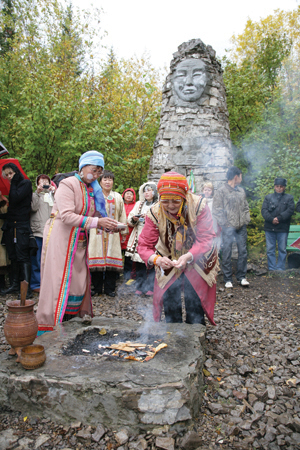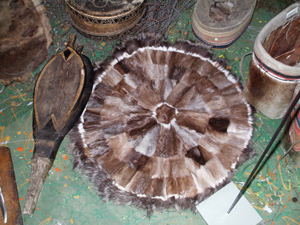Word endings
Linguist Lenore Grenoble helps rescue Arctic languages from extinction.
By Ethan D. Frenchman, AB’08
Photography courtesy Lenore Grenoble
When visiting Siberia, Slavic-linguistics professor Lenore Grenoble does her best to avoid the summer mosquito season—they have “mosquitoes the size of helicopters,” she says—and the spring tick season, when one danger is “a tick-borne encephalitis that U.S. doctors don’t recognize.” Grenoble also tries to skip the long Siberian winter, in full swing by November. But during the months in between, she is often among the region’s nomads, studying and protecting their languages.

At a sacred spot along the Lena River, in Siberia’s Sakha (Yakutia) Republic, an Even elder, whose language and culture are closely tied to Evenki, feeds a ceremonial fire.
In high school Grenoble studied French, Latin, Russian, and German. “As much as I liked to read literature, what I really wanted to do was to analyze and play with languages.” Now beyond playing, she is a leader in a worldwide movement to save languages.
Many are in need of saving. The United Nations predicts that more than half of the world’s 6,000 to 7,000 languages will disappear by the end of the 21st century—a rate of one lost every two weeks. Such a change would be an enormous blow to global cultural diversity and, Grenoble says, to “an integral part of what makes us human.”
Siberia is one of many places around the world where minority communities face pressure to adopt dominant languages, like Russian, Chinese, or English. “Many indigenous people do not have full rights, have been colonized, and have suffered forced education,” says Grenoble. “They have been forced to lose their language.” Change can also begin more subtly, without coercion. Traders may learn a new language simply to sell their goods more widely.
Since the Soviet Union’s breakup, Grenoble has traveled to remote Siberian corners to document an endangered language called Evenki. Ethnic Evenkis constitute a Russian and Chinese minority of 35,000 nomadic hunters and reindeer herders, but only 5,000 of them use their eponymous language, and almost all mix it with Russian. Evenki speakers, Grenoble says, live in small villages of fewer than 200 residents.
The unforgiving environment that makes Siberian life difficult has had a similar effect on its languages, she says; there are no Evenki words for fruit or vegetables because those foods are not native. Rice and grains are imported. “I’ve lived with a hunter, and it’s good if he catches something like caribou or moose because a moose is a big animal,” Grenoble notes. “I’ve also lived in villages where, if the hunting is bad, then people just don’t have food.”
The Evenki people, she says, are fiercely proud of their language and traditions. When guests arrive, they are treated to a “delicacy of raw reindeer liver, sliced, and with any luck somewhat frozen,” she recalls. “You dip it in salt and pepper, swallow quickly, and chase it with vodka.”
Over the past decade Grenoble has become a special guest in the region. Her efforts to document Evenki have helped to perpetuate the language and to change what it means to be Evenki. “The Soviet Union did not go through something like the civil-rights movement,” she notes. After the USSR broke up, the Evenki, long persecuted by the Soviets, developed their own sense of rights and values. Now, as they work to save their language from extinction, Grenoble helps them create textbooks, workbooks, dictionaries, and other tools to pass on the language.

A kumalan, an Evenki reindeer-fur rug.
The Evenki community is also in the midst of reviving its traditional shamanist religious practice, a source of shame under the USSR. (Before the Soviets arrived, Eastern Orthodox Russians tried for centuries to convert Evenki from their native beliefs; the word “shaman” originates in Evenki.) Even after their religion was outlawed and the USSR began executing shamans, often the leaders of their communities, many shamans kept practicing in secret. On future trips, Grenoble hopes to document their speech.
In 2006 Grenoble coauthored Saving Languages (Cambridge University Press), a guide for activists and scholars hoping to rescue indigenous languages from extinction. Her interests have since expanded to other “languages of the north.” In particular, she spends time in Greenland to understand how a new threat, climate change, will affect linguistic patterns and what Inuits in Greenland are doing to preserve their language.
Across the Arctic, Grenoble says, “people are dependent on natural resources in a direct way.” Many in Greenland hunt and fish for subsistence. As ice along the coast has melted, their livelihoods have suffered. It is not uncommon, she says, to hear stories of fishermen falling through thin ice. Higher temperatures lead to higher humidity, which impedes respiration and keeps fishermen from performing what was once a full day’s work. These changes will affect the traditional Inuit lifestyle, Grenoble predicts, and cultural shifts impose stresses on language.
Although there are only 50,000 speakers of Greenlandic, Grenoble does not believe the language is in danger of immediate extinction. Through the efforts of local leaders and a deliberate national language policy, Greenlandic is thriving. Climate change looms, but “the people are not frantic,” she says. “The people consider themselves to be very adaptable, and they feel that they will adapt.”
Grenoble’s mix of activism and scholarship is part of a global trend. “In linguistics,” she says, “ethical research collaborates with indigenous communities.” This approach sometimes diverts scholars’ attention from their research, but for Grenoble it’s a matter of friendship. “You live with the people, and they become your friends,” she says. “I think once you start working with endangered communities, it’s hard not to be an activist.”
